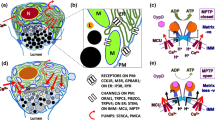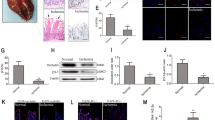Abstract
The animal models of traumatic pancreatitis (TP) were established to evaluate the specific mechanisms by which umbilical cord mesenchymal stem cell-derived exosomes (ucMSC-Ex) exert therapeutic effects. Sixty four rats were randomly divided into eight groups, including TP groups with three different degrees and relevant groups with ucMSC-Ex treated. The degrees of pancreatic tissue injury were evaluated by Histological Examination. Furthermore, enzyme-linked immunosorbent assay were applied to evaluate the activity of pancreatic enzymes and levels of inflammatory factors in serum. Finally, the apoptotic effects of each group were evaluated by TUNEL, western blot (WB), and real time fluorescence quantitative polymerase chain reaction (RT-qPCR). The pancreatic histopathological score and serum amylase and lipase levels gradually increased in various degrees of TP and the levels in the treatment group were all significantly decreased. The apoptosis index gradually increased in each TP group and significantly decreased in the treatment group in TUNEL results. WB and RT-qPCR showed the same trend, that bax and caspase-3 gradually increased and bcl-2 gradually decreased in TP groups. Compared with TP groups, the expression of bax and caspase-3 were lower while bcl-2 expression was higher in the treatment group. ucMSC-Ex suppressed the inflammatory response and inhibited pancreatic acinar cell apoptosis to promote repair of injured pancreatic tissue.







Similar content being viewed by others
Data availability
Availability of data and materials were available in the manuscript.
References
Johnsen NV, Betzold RD, Guillamondegui OD, Dennis BM, Stassen NA, Bhullar I, Ibrahim JA (2017) Surgical management of solid organ injuries. Surg Clin N Am 97(5):1077–1105. https://doi.org/10.1016/j.suc.2017.06.013
Potoka DA, Gaines BA, Leppäniemi A, Peitzman AB (2015) Management of blunt pancreatic trauma: what’s new? Eur J Trauma Emerg Surg 41(3):239–250. https://doi.org/10.1007/s00068-015-0510-3
Sofia VM, Surace C, Terlizzi V, Da Sacco L, Alghisi F, Angiolillo A, Braggion C, Cirilli N, Colombo C, Di Lullo A et al (2018) Trans-heterozygosity for mutations enhances the risk of recurrent/chronic pancreatitis in patients with Cystic Fibrosis. Mol Med (Cambridge, Mass) 24(1):38. https://doi.org/10.1186/s10020-018-0041-6
Giri B, Sethi V, Modi S, Garg B, Banerjee S, Saluja A, Dudeja V (2017) Heat shock protein 70 in pancreatic diseases: friend or foe. J Surg Oncol 116(1):114–122. https://doi.org/10.1002/jso.24653
Manohar M, Verma AK, Venkateshaiah SU, Sanders NL, Mishra A (2017) Pathogenic mechanisms of pancreatitis. World J Gastrointest Pharmacol Ther 8(1):10–25. https://doi.org/10.4292/wjgpt.v8.i1.10
Xiong J, Wang K, Yuan C, Xing R, Ni J, Hu G, Chen F, Wang X (2017) Luteolin protects mice from severe acute pancreatitis by exerting HO-1-mediated anti-inflammatory and antioxidant effects. Int J Mol Med 39(1):113–125. https://doi.org/10.3892/ijmm.2016.2809
Dong Z, Shang H, Chen YQ, Pan LL, Bhatia M, Sun J (2016) Sulforaphane protects pancreatic acinar cell injury by modulating Nrf2-mediated oxidative stress and NLRP3 inflammatory pathway. Oxid Med Cell Longev 2016:7864150. https://doi.org/10.1155/2016/7864150
Pan B, Li Y, Liu Y, Wang W, Huang G, Ouyang Y (2021) Circulating CitH3 is a reliable diagnostic and prognostic biomarker of septic patients in acute pancreatitis. Front Immunol 12:766391. https://doi.org/10.3389/fimmu.2021.766391
Tang Y, Sun M, Liu Z (2022) Phytochemicals with protective effects against acute pancreatitis: a review of recent literature. Pharm Biol 60(1):479–490. https://doi.org/10.1080/13880209.2022.2039723
Xiong GF, Li DW, Zheng MB, Liu SC (2019) The effects of lycium barbarum polysaccharide (LBP) in a mouse model of cerulein-induced acute pancreatitis. Med Sci Monit 25:3880–3886. https://doi.org/10.12659/msm.913820
Liu Y, Chen XD, Yu J, Chi JL, Long FW, Yang HW, Chen KL, Lv ZY, Zhou B, Peng ZH et al (2017) Deletion Of XIAP reduces the severity of acute pancreatitis via regulation of cell death and nuclear factor-κB activity. Cell Death Dis 8(3):e2685. https://doi.org/10.1038/cddis.2017.70
Wu C, Zhou L, Yuan H, Wu S (2020) Interconnections among major forms of regulated cell death. Apoptosis 25(9–10):616–624. https://doi.org/10.1007/s10495-020-01632-2
Sun Q, Liang R, Li M, Zhou H (2021) Circ_UTRN ameliorates caerulein-induced acute pancreatitis in vitro via reducing inflammation and promoting apoptosis through miR-320-3p/PTK2 axis. J Pharm Pharmacol. https://doi.org/10.1093/jpp/rgab161
Najenson AC, Courreges AP, Perazzo JC, Rubio MF, Vatta MS, Bianciotti LG (2018) Atrial natriuretic peptide reduces inflammation and enhances apoptosis in rat acute pancreatitis. Acta Physiol (Oxford, England) 222(3):e12992. https://doi.org/10.1111/apha.12992
Zhang Q, Zhao C, Zhang L, Sun K, Yu L, Wang X, Ren L, Zhang N, Chen C, Liu J et al (2021) Escin sodium improves the prognosis of acute pancreatitis via promoting cell apoptosis by suppression of the ERK/STAT3 signaling pathway. Oxid Med Cell Longev 2021:9921839. https://doi.org/10.1155/2021/9921839
Savković V, Gantzer H, Reiser U, Selig L, Gaiser S, Sack U, Klöppel G, Mössner J, Keim V, Horn F et al (2007) Clusterin is protective in pancreatitis through anti-apoptotic and anti-inflammatory properties. Biochem Biophys Res Commun 356(2):431–437. https://doi.org/10.1016/j.bbrc.2007.02.148
Wang N, Ma J, Ren Y, Xiang S, Jia R (2019) Secreted klotho from exosomes alleviates inflammation and apoptosis in acute pancreatitis. Am J Transl Res 11(6):3375–3383
Dai R, Chen G, Huang Z, Yan H, Lin N, Yan Y, Wang T, Tang L (2012) Establishment and characteristics of an animal model for isolated pancreatic trauma. J Trauma Acute Care Surg 73(3):648–653. https://doi.org/10.1097/TA.0b013e318250ad07
Schmidt J, Rattner DW, Lewandrowski K, Compton CC, Mandavilli U, Knoefel WT, Warshaw AL (1992) A better model of acute pancreatitis for evaluating therapy. Ann Surg 215(1):44–56. https://doi.org/10.1097/00000658-199201000-00007
Serra F, Barbato G, Tazzioli G, Gelmini R (2019) Pancreaticogastrostomy as reconstruction choice in pancreatic trauma surgery: case report and review of the literature. Int J Surg Case Rep 65:102–106. https://doi.org/10.1016/j.ijscr.2019.10.030
Zhao Q, Wei Y, Pandol SJ, Li L, Habtezion A (2018) STING signaling promotes inflammation in experimental acute pancreatitis. Gastroenterology 154(6):1822-1835.e1822. https://doi.org/10.1053/j.gastro.2018.01.065
Barrera K, Stanek A, Okochi K, Niewiadomska Z, Mueller C, Ou P, John D, Alfonso AE, Tenner S, Huan C (2018) Acinar cell injury induced by inadequate unfolded protein response in acute pancreatitis. World J Gastrointest Pathophysiol 9(2):37–46. https://doi.org/10.4291/wjgp.v9.i2.37
Zhou L, Tan JH, Zhou WY, Xu J, Ren SJ, Lin ZY, Chen XM, Zhang GW (2020) P53 activated by ER stress aggravates caerulein-induced acute pancreatitis progression by inducing acinar cell apoptosis. Dig Dis Sci 65(11):3211–3222. https://doi.org/10.1007/s10620-020-06052-5
Tan JH, Cao RC, Zhou L, Zhou ZT, Chen HJ, Xu J, Chen XM, Jin YC, Lin JY, Zeng JL et al (2020) ATF6 aggravates acinar cell apoptosis and injury by regulating p53/AIFM2 transcription in severe acute pancreatitis. Theranostics 10(18):8298–8314. https://doi.org/10.7150/thno.46934
Li S, Liu X, Chen X, Bi L (2020) Research progress on anti-inflammatory effects and mechanisms of alkaloids from Chinese medical herbs. Evid Based Complement Altern Med 2020:1303524. https://doi.org/10.1155/2020/1303524
Ni B, Shen H, Wang W, Lu H, Jiang L (2019) TGF-β1 reduces the oxidative stress-induced autophagy and apoptosis in rat annulus fibrosus cells through the ERK signaling pathway. J Orthop Surg Res 14(1):241. https://doi.org/10.1186/s13018-019-1260-4
Mu LH, Wang YN, Wang DX, Zhang J, Liu L, Dong XZ, Hu Y, Liu P (2017) AG36 inhibits human breast cancer cells proliferation by promotion of apoptosis in vitro and in vivo. Front Pharmacol 8:15. https://doi.org/10.3389/fphar.2017.00015
Zhu C, Jiang Y, Zhu J, He Y, Yin H, Duan Q, Zhang L, Cao B, An X (2020) CircRNA8220 sponges MiR-8516 to regulate cell viability and milk synthesis via Ras/MEK/ERK and PI3K/AKT/mTOR pathways in goat mammary epithelial cells. Animals 10(8):13147. https://doi.org/10.3390/ani10081347
Lv J, Zhang F, Zhai C, Wang G, Qu Y (2019) Bag-1 silence sensitizes non-small cell lung cancer cells to cisplatin through multiple gene pathways. Onco Targets Ther 12:8977–8989. https://doi.org/10.2147/ott.S218182
Ferrero-Andrés A, Panisello-Roselló A, Roselló-Catafau J, Folch-Puy E (2020) Polyethylene glycol 35 ameliorates pancreatic inflammatory response in cerulein-induced acute pancreatitis in rats. World J Gastroenterol 26(39):5970–5982. https://doi.org/10.3748/wjg.v26.i39.5970
Bansod S, Godugu C (2021) Nimbolide ameliorates pancreatic inflammation and apoptosis by modulating NF-κB/SIRT1 and apoptosis signaling in acute pancreatitis model. Int Immunopharmacol 90:107246. https://doi.org/10.1016/j.intimp.2020.107246
Shen Y, Xue C, You G, Liu C (2021) miR-9 alleviated the inflammatory response and apoptosis in caerulein-induced acute pancreatitis by regulating FGF10 and the NF-κB signaling pathway. Exp Ther Med 22(2):795. https://doi.org/10.3892/etm.2021.10227
Acknowledgements
Not applicable.
Funding
Hospital Management of the General Hospital of Western Theater Command (2021-XZYG-B16), the Sichuan Science and Technology Program (2022YFS0195).
Author information
Authors and Affiliations
Contributions
ZRZ and LH conceived and implemented the experiments; YQH, CYH, LCZ and ZT conducted the statistical analysis; TW revised the manuscript; RWD reviewed and revised the manuscript. All authors read and approved the final manuscript.
Corresponding author
Ethics declarations
Conflict of interest
Authors declare that no competing financial interest or conflict of interest exist.
Ethical approval
This study was approved by the ethics committee of the General Hospital of Western Theater Command (2021EC2-20). Every effort was made to minimize animal suffering in the study.
Additional information
Publisher's Note
Springer Nature remains neutral with regard to jurisdictional claims in published maps and institutional affiliations.
Rights and permissions
About this article
Cite this article
Zhirong, Z., Li, H., Yiqun, H. et al. Enhancing or inhibiting apoptosis? The effects of ucMSC-Ex in the treatment of different degrees of traumatic pancreatitis. Apoptosis 27, 521–530 (2022). https://doi.org/10.1007/s10495-022-01732-1
Accepted:
Published:
Issue Date:
DOI: https://doi.org/10.1007/s10495-022-01732-1




